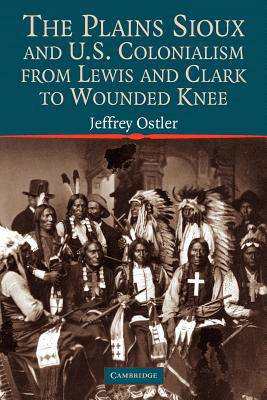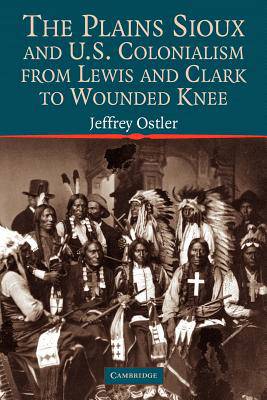
- Afhalen na 1 uur in een winkel met voorraad
- Gratis thuislevering in België vanaf € 30
- Ruim aanbod met 7 miljoen producten
- Afhalen na 1 uur in een winkel met voorraad
- Gratis thuislevering in België vanaf € 30
- Ruim aanbod met 7 miljoen producten
Zoeken
The Plains Sioux and U.S. Colonialism from Lewis and Clark to Wounded Knee
Jeffrey Ostler
€ 62,45
+ 124 punten
Uitvoering
Omschrijving
Through the interpretive lens of colonial theory, Jeffrey Ostler presents an original analysis of the tumultuous relationship between the Plains Sioux and the United States in the 1800s. He provides novel insights on well-known aspects of the Sioux story, such as the Oregon Trail, the deaths of "Crazy Horse" and "Sitting Bull", and the Ghost Dance, and offers an in-depth look at many lesser-known facets of Sioux history and culture. Paying close attention to Sioux perspectives of their history, the book demonstrates how the Sioux creatively responded to the challenges of U.S. expansion and domination, revealing simultaneously how U.S. power increasingly limited the autonomy of their communities as the century came to a close. Ostler's innovative analysis of the Plains Sioux culminates in a compelling reinterpretation of the events that led to the Wounded Knee massacre of December 29, 1890. History Department Head at the University of Oregon, Associate Professor Jeffrey Ostler has held honors such as the National Endowment for the Humanities Fellowship and has published articles in Western Historical Quarterly, Great Plains Quarterly, and Pacific Historical Review.
Specificaties
Betrokkenen
- Auteur(s):
- Uitgeverij:
Inhoud
- Aantal bladzijden:
- 387
- Taal:
- Engels
- Reeks:
Eigenschappen
- Productcode (EAN):
- 9780521605908
- Verschijningsdatum:
- 5/07/2004
- Uitvoering:
- Paperback
- Formaat:
- Trade paperback (VS)
- Afmetingen:
- 152 mm x 229 mm
- Gewicht:
- 612 g

Alleen bij Standaard Boekhandel
+ 124 punten op je klantenkaart van Standaard Boekhandel
Beoordelingen
We publiceren alleen reviews die voldoen aan de voorwaarden voor reviews. Bekijk onze voorwaarden voor reviews.











